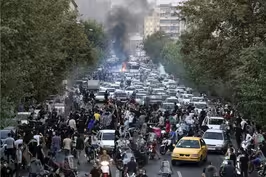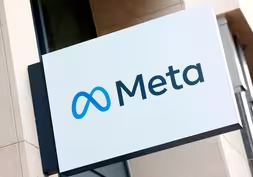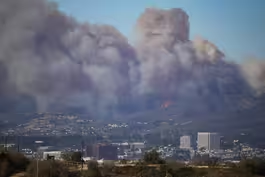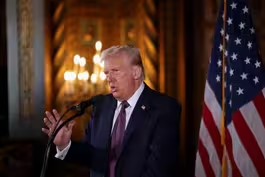
Minneapolis agrees to federal oversight of its police
Clip: 1/7/2025 | 6m 17sVideo has Closed Captions
Minneapolis agrees to federal oversight of its police 4 years after George Floyd murder
The U.S. has long been one of the world’s largest donors of foreign aid. But in recent years, its effectiveness has been called into question by a chorus of critics who say the impact of assistance programs falls well short of their intended goals. They blame what some have called the "aid industrial complex." Fred de Sam Lazaro reports for his series, Agents for Change.
Problems playing video? | Closed Captioning Feedback
Problems playing video? | Closed Captioning Feedback
Major corporate funding for the PBS News Hour is provided by BDO, BNSF, Consumer Cellular, American Cruise Lines, and Raymond James. Funding for the PBS NewsHour Weekend is provided by...

Minneapolis agrees to federal oversight of its police
Clip: 1/7/2025 | 6m 17sVideo has Closed Captions
The U.S. has long been one of the world’s largest donors of foreign aid. But in recent years, its effectiveness has been called into question by a chorus of critics who say the impact of assistance programs falls well short of their intended goals. They blame what some have called the "aid industrial complex." Fred de Sam Lazaro reports for his series, Agents for Change.
Problems playing video? | Closed Captioning Feedback
How to Watch PBS News Hour
PBS News Hour is available to stream on pbs.org and the free PBS App, available on iPhone, Apple TV, Android TV, Android smartphones, Amazon Fire TV, Amazon Fire Tablet, Roku, Samsung Smart TV, and Vizio.
Providing Support for PBS.org
Learn Moreabout PBS online sponsorshipAMNA NAWAZ: The city of Minneapolis approved a police reform agreement yesterday with the federal government 4.5 years after the murder of George Floyd.
Stephanie Sy has more now on the context around that deal and others like it.
STEPHANIE SY: Amna, the agreement, known as a consent decree, allows a court-appointed monitor to oversee changes to the Minneapolis Police Department.
Among other directives, it requires officers to intervene when they see a colleague break department rules.
If approved by a judge, it would become the 16th such settlement that the Department of Justice is now enforcing with police agencies.
But the future of federal oversight over local police is murky, as president-elect Trump gets set to return to the White House.
For more on all this, we're joined by Alex del Carmen.
He's a criminologist at Tarleton State University in Texas and has served as a consent decree monitor himself.
Alex del Carmen, thank you so much for joining the "News Hour."
So, as you know, this consent decree in Minneapolis is the result of a DOJ report from 2023 that found routine racial discrimination and unjustified use of deadly force in the city's police department.
How do consent decrees work to address these types of problems?
ALEX DEL CARMEN, Tarleton State University: Typically, DOJ would not be involved in a situation like that unless there was reason to, right?
So in this particular case, we all saw, obviously with horror, what happened to George Floyd.
And as a result of that, DOJ felt compelled to go into this police department and begin the investigation.
It's what they call a pattern or a practice investigation, which means, is this problem pervasive in the entire department?
And, if so, to what degree and what areas of policing should be looked at?
STEPHANIE SY: The ostensible goal of a consent decree is to make sure that a police department abides by the Constitution, that there is lawful police behavior.
How effective are consent decrees at doing that?
ALEX DEL CARMEN: Well, it depends on who you ask, right?
Those individuals that are opponents of the consent decree, they say that it is -- it costs too much money, that cities have to essentially pay for it, and that there's not necessarily a duration or a limit on the amount of time in which a decree expire.
Even though there is a goal that some of them should finish within a certain amount of time, seldom do we ever see that they finish within that timeline.
And others have actually even argued that crime goes up, that the morale of police officers goes way down when these take place.
Now, those that actually support the consent decree, conversely, say that consent decrees are really important because there are times that the federal government has to intervene in order for a police department to be reformed.
And we have seen that throughout the history of our nation, where, at times, the federal government has had to send federal agents in order for civil rights to be protected.
Secondly, some of them actually, those that propose consent decrees, argue that resources for police officers actually increase, because now you have a court order that mandates for some of these resources to be given to officers, that best practices are put into play, and that the police department gains in terms of credibility with the community.
So it's a mixed bag.
It depends on who you ask.
STEPHANIE SY: Is there a sense that having a consent decree can prevent the type of incident that we saw with George Floyd and with others, that a consent decree can be effective at addressing, for example, systemic racial discrimination in policing?
ALEX DEL CARMEN: So the rationale is that, yes, in fact, that they can do that, right?
So, what typically happens in these consent decrees is, once the investigation takes place, as we saw the case yesterday in Minneapolis, they enter into an agreement with the city, in this case, DOJ does, and then it goes up before the federal judge.
And, as you noted, once the federal judge approves that, then they have to select the monitor and a team of individuals that are national or international experts that actually show up at the scene, and they begin to regulate and monitor the behavior of police officers, policies, procedures, academy trainings and whatnot.
And so, in concept, what this does is, it sort of changes the culture and the level of expectation of policing that would actually have been in place up to that point.
So the idea is, is that you are going to reform the police department from within, that you are going to affect the culture and that the outcome is going to be radically different in years to come.
STEPHANIE SY: The Department of Justice in the first Trump administration did not pursue or support consent decrease at all.
Assuming that continues to be the case in a second Trump term, what are the options for communities that do feel like they are dealing with a problematic police force?
What are the other tools or options that they have?
ALEX DEL CARMEN: So what's happened since the last Trump administration is that many states throughout the United States, the legislators have actually empowered the attorney generals of those particular states to actually sue the police departments and put them under some form of a consent decree if agreed.
And so what that means is that now you have roughly over 20 states in the U.S. that have attorney generals that have the legislative given power for them to sue local police agencies and enter into an agreement, if the agreement actually is substantiated in the court of law.
This happened actually in Illinois, where we saw the -- during the first Trump administration, that the attorney general of the state of Illinois actually sued the Chicago Police Department, and the U.S. DOJ did not want to enter into that particular case.
In fact, they actually filed a motion against it, but yet the federal judge ruled in favor of the attorney general, and a consent decree is in place now, even though the DOJ is not the plaintiff in this particular case.
I think we're going to see a little bit more of that in the next four years, as it is clear to me that the next administration is going to simply not engage in the practice of consent decrees across the U.S. STEPHANIE SY: Alex del Carmen, a criminologist at Tarleton State University in Texas, thanks so much for joining us with your insights.
ALEX DEL CARMEN: Thanks for having me.
Activists in Iran describe threats they face for protesting
Video has Closed Captions
Clip: 1/7/2025 | 5m 47s | Activists in Iran describe the threats and oppression they face for protesting (5m 47s)
Artist uses elements of natural world to see it in new ways
Video has Closed Captions
Clip: 1/7/2025 | 5m 36s | Artist uses elements of the natural world to see it in new ways (5m 36s)
Meta drops fact-checking, critics fear misinformation spike
Video has Closed Captions
Clip: 1/7/2025 | 5m 44s | As Meta drops fact-checking, critics fear it could pave the way for a misinformation spike (5m 44s)
News Wrap: Wildfire in Los Angeles hills explodes in size
Video has Closed Captions
Clip: 1/7/2025 | 6m 29s | News Wrap: Wildfire in hills of Los Angeles rapidly explodes in size (6m 29s)
Trump expresses desire to expanding U.S. territory
Video has Closed Captions
Clip: 1/7/2025 | 4m 30s | Trump expresses desire to expand U.S. territory, use economic force to pressure Canada (4m 30s)
U.S. accuses Sudan's rebel forces of committing genocide
Video has Closed Captions
Clip: 1/7/2025 | 8m 19s | U.S. accuses Sudan's rebel forces of committing genocide (8m 19s)
Where does U.S. foreign aid go and does it make an impact?
Video has Closed Captions
Clip: 1/7/2025 | 8m 41s | Where does U.S. foreign aid go and does it make an impact? (8m 41s)
Providing Support for PBS.org
Learn Moreabout PBS online sponsorship
- News and Public Affairs

FRONTLINE is investigative journalism that questions, explains and changes our world.

- News and Public Affairs

Amanpour and Company features conversations with leaders and decision makers.












Support for PBS provided by:
Major corporate funding for the PBS News Hour is provided by BDO, BNSF, Consumer Cellular, American Cruise Lines, and Raymond James. Funding for the PBS NewsHour Weekend is provided by...






